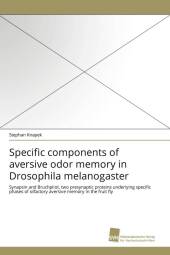 Neuerscheinungen 2011Stand: 2020-01-07 |
Schnellsuche
ISBN/Stichwort/Autor
|
Herderstraße 10
10625 Berlin
Tel.: 030 315 714 16
Fax 030 315 714 14
info@buchspektrum.de |

Stephan Knapek
Specific components of aversive odor memory in Drosophila melanogaster
Synapsin and Bruchpilot, two presynaptic proteins underlying specific phases of olfactory aversive memory in the fruit fly
2011. 88 S. 220 mm
Verlag/Jahr: SÜDWESTDEUTSCHER VERLAG FÜR HOCHSCHULSCHRIFTEN 2011
ISBN: 3-8381-2061-2 (3838120612)
Neue ISBN: 978-3-8381-2061-4 (9783838120614)
Preis und Lieferzeit: Bitte klicken
Memory is dynamic: after pairing an odor with electric shocks, flies form an aversive odor memory that lasts for several hours and consists of qualitatively different components. An anesthesia-sensitive memory component (ASM) decays rapidly, whereas a consolidated anesthesia-resistant memory component (ARM) lasts significantly longer. Here the author shows that the evolutionary conserved phosphoprotein Synapsin is selectively required for the labile ASM. Synapsin is associated with a reserve pool of vesicles at the presynapse and is required to maintain vesicle release specifically under sustained high frequency nerve stimulation. In contrast, the requirement of the active zone protein Bruchpilot is most pronounced in immediate vesicle release. The author shows that Bruchpilot is required for aversive olfactory memory and localizes the requirement of Bruchpilot to the Kenyon cells of the mushroom body, the second-order olfactory interneurons in Drosophila. He demonstrates that Bruchpilot preferentially functions for the consolidated ARM. Thus, different presynaptic proteins can dissociate consolidated and labile components of olfactory memory.
Stephan Knapek studied biology at the University of Würzburg, Germany. He did his PhD as a member of an international research training group at the department of Neurobiology and Genetics, where he studied the mechanisms underlying olfactory learning and memory. Today he works at the Max-Planck Institute of Neurobiology in Munich, Germany.


